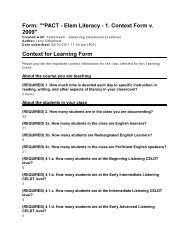The Tutoring Book - California State University, Sacramento
The Tutoring Book - California State University, Sacramento
The Tutoring Book - California State University, Sacramento
Create successful ePaper yourself
Turn your PDF publications into a flip-book with our unique Google optimized e-Paper software.
<strong>Tutoring</strong> the Student Not the LD<br />
56<br />
M. Isabel Chavez<br />
Spring 2005<br />
When students come into the Writing Center, we see them as writers. Usually, we do not know<br />
much about them; we may come to know their major and their year once they fill out the sign up slip or<br />
drop-in form. However, what is clear is that they are seeking help with their writing by entering the<br />
Writing Center door. As writers, students encounter all sorts of problems from writer’s block to a lack of<br />
analysis in their essays to becoming completely frustrated with a writing assignment. <strong>The</strong>se are common<br />
problems for writers, but the writers themselves are not common. This semester I have been lucky to<br />
learn from writers with learning disabilities. Since their disabilities are not physiological, until they<br />
informed me of their learning process problems, I was unaware that talking and writing were not enough.<br />
Some writers need extra help, others need creative ways to learn how to formulate an essay, and others<br />
need explicit lessons on how to write an essay such as pre-writing, writing and revising. Regardless of<br />
the method of process and learning modes, the end result is, and should be, both a product and an<br />
effective method that facilitates learning and writing for student-writers.<br />
As tutors, we are leading writers to assertiveness and independence in their writing skills. We want<br />
students to be confident in their process and finished products. Through collaboration, writers and tutors<br />
arrive at the style that will give writers the tools to be confident and able writers. But collaboration alone<br />
is not enough for some students. Through collaboration, we find that the relationship is give and take: the<br />
writer learns as does the tutor. Collaboration tends to decenter authority in the relationship between tutor<br />
and writer, but for some students, the decentering of authority does not enable them to achieve the tools<br />
they need to be successful writers. Occasionally, students who have challenges that require a more direct<br />
approach than collaboration come into the Writing Center for help.<br />
This semester I have worked with several writers with learning disabilities, mainly auditory<br />
processing problems and short term memory problems. Learning disabilities are not psychological;<br />
moreover, the Learning Disabilities Act of 1968 defines them as “a disorder in one or more of the basic<br />
physiological processes involved in understanding or in using spoken or written languages.” Learning<br />
disabilities are permanent, and throughout life they can range in “expression and severity” (Learning<br />
Disabilities Overview Handout). When I began to work with the writers who had auditory processing and<br />
memory problems, I was unaware of their disabilities until they disclosed them themselves; moreover, it<br />
is against the law to ask a writer if they have a learning disability and then to access information<br />
regarding the nature of the student’s disability. Had it not been for their honesty to try to explain some of<br />
the reasons why they struggled with writing, I would have assumed they were just students who had had<br />
bad experiences with writing in the past or simply did not like writing. Learning disabilities are not due<br />
to “low intelligence, social situations, or economic conditions” (Neff 379). Thus, since we cannot tell by<br />
looking at writers what kind of help all will need before we talk to them, as tutors we need to be open to<br />
different approaches when working with students.<br />
In the Writing Center, we work on the principle of collaboration. As tutors, we do not want to coopt<br />
the students’ work, so we create an environment in which working together, often in a non-directive<br />
way, students receive suggestions or advice on how to improve their writing. Collaboration assumes that<br />
we are all learners in this atmosphere, and hence, both parties contribute to the half an hour or hour<br />
session. However, as I got to know some of my writers, I realized that collaboration without some<br />
explicit information and ways to improve the writing was preventing the writers from moving forward.<br />
One writer, Mari (not writer’s real name) has an auditory processing problem and a short term memory<br />
problem; in class, she struggles to take notes because not only does she sometimes not understand what

















